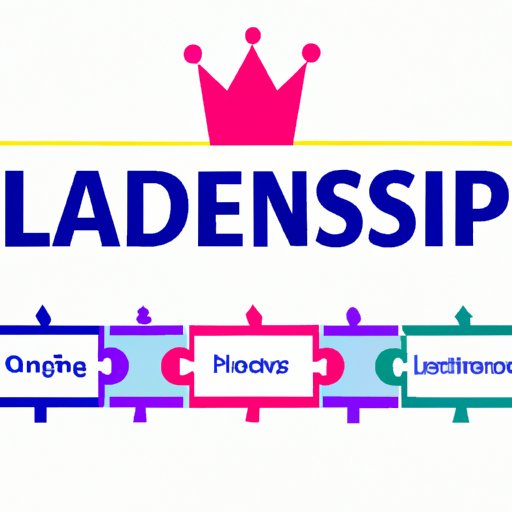Introduction
Leadership is a complex concept with many facets that can be difficult to define. At its core, it is the process of influencing others to work toward a shared goal or vision. Leaders must possess the ability to motivate, inspire, and guide their team members, while also being able to make difficult decisions and manage conflicts. This article will explore the concept of leadership in greater detail, examining different types of leadership styles, qualities of effective leaders, and the role of emotional intelligence in leadership.

Defining Leadership: An Overview of the Concept
Leadership can be defined as the process of influencing people and directing them to achieve a common goal or vision. According to John C. Maxwell, “Leadership is influence—nothing more, nothing less.” 1 As such, it is important for leaders to have the ability to motivate and inspire their team members to reach their goals.
Effective leadership requires a combination of charisma and skill. Leaders must be able to articulate their vision and motivate their team to strive for excellence. They must also possess the necessary skills to manage conflict, build trust, and make difficult decisions.
Exploring Different Types of Leadership Styles
Leaders come in all shapes and sizes, and there are many different types of leadership styles. Each style has its own strengths and weaknesses, and it is important for leaders to choose the right style for the situation. Below are some of the most common types of leadership styles:
Autocratic Leadership
Autocratic leadership is a top-down management style where the leader makes all decisions without consulting the team. This type of leadership is best suited for situations where quick decisions need to be made and there is no time for discussion. While this style can be effective in certain scenarios, it can also lead to low morale and decreased motivation among team members.
Democratic Leadership
Democratic leadership is a collaborative approach where the leader seeks input from the team before making decisions. This style encourages creativity and innovation among team members, as they are given the opportunity to contribute their ideas. However, it can be time-consuming and may not be suitable for situations where quick decisions need to be made.
Laissez-Faire Leadership
In laissez-faire leadership, the leader delegates tasks to team members and allows them to work independently. This style can be beneficial in certain circumstances, as it encourages team members to take initiative and come up with creative solutions. However, it can also lead to a lack of direction and accountability if the leader does not provide adequate guidance and support.
Transformational Leadership
Transformational leadership is a style of leadership that focuses on motivating and inspiring team members to achieve their full potential. This style of leadership emphasizes empathy, communication, and collaboration, and it is often seen as the most effective type of leadership.

Examining the Qualities of an Effective Leader
Leaders must possess a variety of skills in order to be successful. Below are some of the most important qualities of an effective leader:
Vision and Goal Setting
An effective leader must have a clear vision of the future and be able to set achievable goals. They must be able to articulate this vision to their team so that everyone is working toward the same goal.
Communication Skills
Leaders must have strong communication skills in order to effectively convey their vision and motivate their team. They must also be able to listen to their team members and provide feedback in a constructive manner.
Decision Making
Leaders must be able to make difficult decisions in a timely manner. They must also be able to evaluate the risks and benefits of each decision and determine the best course of action.
Conflict Resolution
Leaders must be able to identify and resolve conflicts in a constructive manner. They must also be able to mediate disputes between team members and ensure that everyone is treated fairly.
Empathy
Leaders must be able to understand and empathize with their team members. They must be able to recognize the feelings and needs of others and provide support where needed.
Investigating the Role of Emotional Intelligence in Leadership
Emotional intelligence (EI) is the ability to recognize and manage one’s own emotions, as well as those of others. It is an important quality for leaders to possess, as it enables them to better understand the motivations and feelings of their team members. Below are some of the key components of EI:
Self-Awareness
Self-awareness is the ability to recognize and understand one’s own emotions. Leaders must be aware of their own strengths and weaknesses in order to be effective.
Social Awareness
Social awareness is the ability to recognize the emotions and feelings of others. Leaders must be able to understand the perspectives of their team members in order to effectively manage conflicts and resolve disputes.
Self-Management
Self-management is the ability to control and manage one’s emotions. Leaders must be able to maintain their composure in difficult situations and remain calm under pressure.
Relationship Management
Relationship management is the ability to build positive relationships with team members. Leaders must be able to foster trust and respect among their team in order to maximize performance.

Analyzing the Impact of Gender on Leadership
Gender roles have traditionally been seen as a barrier to female leadership. Women are often overlooked for leadership roles due to traditional views on gender roles. However, research has shown that diversity in leadership is beneficial for organizations. Studies have found that companies with a higher percentage of women in leadership positions perform better financially. 2 Furthermore, having a diverse team of leaders can help to create an inclusive and supportive culture within an organization.

Understanding the Challenges Faced by Leaders
Leadership can be a difficult and demanding job. Leaders must be able to manage a variety of tasks and responsibilities, as well as dealing with conflicts and challenging team members. Below are some of the common challenges faced by leaders:
Delegating Tasks
Leaders must be able to delegate tasks to team members in a way that maximizes efficiency and productivity. They must also be able to provide clear instructions and guidance to ensure that tasks are completed in a timely manner.
Resolving Conflicts
Leaders must be able to identify and resolve conflicts in a constructive manner. They must be able to mediate disputes and ensure that everyone is treated fairly.
Building Trust
Leaders must be able to build trust with their team members. They must be able to create an environment of mutual respect and open communication in order to foster collaboration and innovation.
Managing Change
Leaders must be able to manage change effectively. They must be able to anticipate changes and adapt quickly in order to stay ahead of the competition.
Examining the Relationship Between Leadership and Success
Leadership is essential for organizational success. Effective leaders must be able to develop a strategic plan and motivate their team to achieve their goals. They must also be able to recognize the importance of teamwork and be willing to make difficult decisions.
The Role of Strategic Planning
Leaders must be able to develop a strategic plan that outlines the steps needed to achieve their goals. They must be able to anticipate changes and adapt their plans accordingly.
The Importance of Motivation
Leaders must be able to motivate their team members and encourage them to strive for excellence. They must be able to recognize the strengths and weaknesses of their team and provide support where needed.
Valuing Teamwork
Leaders must be able to recognize the importance of teamwork. They must be able to foster collaboration and create an environment of open communication.
Conclusion
Leadership is a complex concept that involves a variety of skills and qualities. Leaders must possess the ability to motivate and inspire their team, while also having the necessary skills to manage conflicts and make difficult decisions. They must also be able to recognize the importance of emotional intelligence and gender diversity in leadership. Finally, effective leaders must be able to develop a strategic plan and value teamwork in order to achieve success.
Summary of Main Points
This article explored the concept of leadership in depth. It examined different types of leadership styles, qualities of effective leaders, and the role of emotional intelligence in leadership. It also discussed the impact of gender on leadership and the challenges faced by leaders. Lastly, it looked at the relationship between leadership and success, highlighting the importance of strategic planning, motivation, and teamwork.
Final Thoughts
Leadership is an essential component of organizational success. Effective leaders must possess a variety of skills and qualities in order to motivate and inspire their team. They must also be able to recognize the importance of emotional intelligence and gender diversity in leadership.
1 Maxwell, J.C., “Leadership 101,” Thomas Nelson, 2001.
2 Bagilhole, B., & White, R. (2009). Women in managerial and professional positions: Exploring the glass ceiling phenomenon. International Journal of Manpower, 30(7), 672-689.
(Note: Is this article not meeting your expectations? Do you have knowledge or insights to share? Unlock new opportunities and expand your reach by joining our authors team. Click Registration to join us and share your expertise with our readers.)
